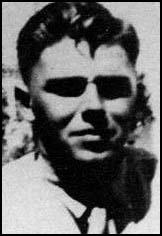Difference between revisions of "Anthony Poshepny"
(unstub) |
m (Robin moved page Anthony A. Poshepny to Anthony Poshepny over redirect: Shorter, simpler) |
Latest revision as of 14:39, 28 February 2021
(spook) | |
|---|---|
 | |
| Born | 18th September, 1924 Long Beach, California, USA |
| Died | 2003-06-27 (Age 78) California, U.S. |
| Alma mater | San Jose State University |
"I used to collect ears... I had a big, green, reinforced cellophane bag as you walked up my steps." | |
Anthony Alexander Poshepny known as Tony Poe, was a CIA Paramilitary Operations Officer in what is now called Special Activities Division.[1] He is best known for his involvement in Laos with the Special Guerilla Units (SGUs) under the command of General Vang Pao, a U.S.-funded secret army in Laos during the Vietnam War, and is intimately connected to decades of heroin drug trade in South East Asia and for export.
Early life and career
Poshepny was born in Long Beach, California, to John Charles and Isabel M. (Veriziano) Poshepny. His father was a United States Navy officer whose parents were immigrants from Bohemia. His mother was born in Guam.[2]
Shortly after turning 18, he enlisted in the United States Marine Corps during World War II, serving in the 2nd Marine Parachute Battalion and fighting in the 5th Marine Division on Iwo Jima.[3] He received the Purple Heart twice and was a sergeant by the time he was honorably discharged. Returning to civilian life, he enrolled at Saint Mary's College, before transferring to what is now San Jose State University. He contemplated going to work for the FBI. Graduating in 1950, he instead joined the CIA, where he was part of the first recruit class to receive all of its training at the new Camp Peary.
He was active in Korea during the Korean War, training refugees for sabotage missions behind communist lines. He also helped train Chinese Nationalist commandos for missions on the mainland.
Following the Korean war, Poshepny joined the Bangkok-based CIA front company Overseas Southeast Asia Supply (SEA Supply), which provided military equipment to Kuomintang forces based in Burma.
All these activities with the Kuomintang would have put him in contact with General John Singlaub and the drug business.
In 1958, Poshepny tried unsuccessfully to arrange a military uprising against Sukarno, the president of Indonesia.
From 1958 to 1960, he trained different special missions teams, including Tibetan Khampas and Hui Muslims at Camp Hale[4] for operations inside China against the Communist government. Carole McGranahan quotes Poe from an interview that the Tibetans he trained "... were the best I ever worked with."[5] Poshepny sometimes claimed he personally escorted the 14th Dalai Lama out of Tibet, but this is denied both by former CIA officers involved in the Tibet operation and by the Tibetan government-in-exile.
Laos
The CIA was impressed by Poshepny's ability to train paramilitary forces quickly and awarded him the Intelligence Star in 1959. Two years later, working under Bill Lair, he was assigned with J. Vinton Lawrence to train Hmong hill tribes in Laos to fight the North Vietnamese and Pathet Lao forces which were then trying to take over that country. Poshepny gained the respect of the Hmong forces with practices that were considered barbaric, even by CIA standards. He paid Hmong fighters to bring him the ears of dead enemy soldiers, and on at least one occasion mailed a bag of ears to the U.S. Embassy in Vientiane to verify his body counts.[6]
“"I used to collect ears... I had a big, green, reinforced cellophane bag as you walked up my steps. I'd tell my people to put them in, and then I'd staple them to this 5,000 kip (Lao currency) notice that this ear was paid for already, and put them in the bag and send them to Vientiane with the report.. I still collected them, until one day I went out on an inspection trip... and I saw this little Lao kid out there, he's only about 12, and he had no ears. And I asked: `'What the hell happened to this guy?' Somebody said, 'Tony, he heard you were paying for ears. His daddy cut his ears off. For the 5,000 kip' .”
Anthony A. Poshepny (2003) [7]
Over the years, Poshepny became disillusioned with the U.S. government's management of the war. Poshepny was later sent to Nam Yu where he was responsible for sending intelligence teams into China. The CIA extracted Poshepny from Laos in 1970 and assigned him to a training camp in Thailand until his retirement in 1974. He received another Intelligence Star in 1975.
Retirement
After the United States withdrew from Vietnam, Poshepny remained in Thailand with his Hmong wife and four children. He moved the family to California in the 1990s. He frequently appeared at Hmong veterans' gatherings and helped veterans immigrate and settle in the US. He freely admitted his controversial acts during the war to reporters and historians, saying they were a necessary response to communist aggression.
References
- ↑ https://foreignpolicy.com/2016/05/04/measuring-change-at-the-cia/
- ↑ US Census 1830, Vallejo, Solano Co., California, John C. Poshepny, Enumerator's District 48-49, Supervisor's District 5, Sheet 6B, line 86
- ↑ http://www.air-america.org/in-rememberance-1/anthony-tony-poe-poshepny.html
- ↑ https://scroll.in/article/952141/how-the-dalai-lama-staged-a-dramatic-escape-from-tibet-to-india-in-1959
- ↑ http://www.iu.edu/~iaunrc/sites/default/files/podcasts/Sept%2012%202015%20Carole%20McGranahan.mp3 quote=" We don't talk about that. No comment, no comment, no fucking comment, but those Khampas were the best people I ever worked with."
- ↑ https://www.npr.org/2017/01/23/511185078/america-in-laos-traces-the-militarization-of-the-cia
- ↑ https://web.archive.org/web/20091027182725/http://www.geocities.com/asia_correspondent/laos0307ciaposhepnybp.html